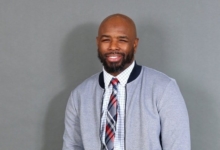Last month was Second Chance Month, so I’ve been thinking a lot about the barriers facing justice-involved people and what having a second chance really means for a formerly incarcerated, first-generation, Black, male college student, like me. In fact, I ponder this question every day, since my reality as a Black man is complicated by a criminal record.
On February 5, 2019, I walked out of prison, knowing that my past would loom over my shoulder like a shadow. I hurried down the concrete corridor, walking between two solid yellow lines painted on the floor toward a large gray steel door. Freedom had seemed so close yet so far away — until then. I remember feeling like Ray Lewis about to sprint out of the tunnel onto the football field, only I knew some in society would be cheering against me.
The tunnel walls were decorated with inscriptions. I paused to read, “Never Again … JoJo 95.” As I traced the letters, “Never Again,” I thought about JoJo, and my own ambition never to return to prison. How much time did he lose in prison? I wondered. Did he keep his promise to never return? I hoped so.
Sadly, though, people like JoJo often struggle because of a lack of support. Many people like him never get a first chance, much less a second, and having a criminal record so often separates justice-impacted people from their communities. I know those struggles all too well, and looking back on that day, I realize that JoJo’s writing on the wall was a warning and an inspiration to me.
Twenty-five years have passed since I committed a crime, and I have been home for three years. In that time, I applied for jobs at Amazon, Uber, Lyft, and Gaudenzia (a drug treatment facility); all of them denied me the opportunity to work. After my release, I moved back into my mother’s one-bedroom apartment and converted her living room into a makeshift bedroom. I worked odd jobs as a contractor, sharing my lived experience with others on the side — neither of which were sustainable pathways to reentry.
Today, I still fail criminal background checks, but I also know what it means to receive a second chance. I was able to pursue a higher education in prison, which helped me learn, grow, and connect with my humanity and with people who did not share my lived experience. That became a key factor not only in my release — Judge Charles Peters released me, in part, because professors in the Goucher Prison Education Partnership (GPEP) program put their reputations on the line in support of my release — but in unlocking my future.
Last year, I was one of eight formerly incarcerated individuals selected from more than 400 applicants to participate in The Education Trust’s Justice Fellows Policy Program, which gives Fellows a $30,000 a year stipend in exchange for 15 hours a month of reading, research, press, and public speaking events. We contributed policy recommendations to Ed Trust’s agenda centered around our lived experiences. We received a second chance. Today, I am the Manager of Higher Education Justice Initiatives at The Education Trust. I work two blocks from the White House and spend my days advocating for others impacted by our nation’s criminal legal system, which has been set up and enforced by people in proximity to power but furthest from the problem, while those closest to the problem are furthest from the power. I’m working to change that.
I reflect on Bill Clinton’s 1994 Crime Bill, which, until just recently, barred incarcerated people from accessing Pell Grants. I believe that if the U.S. criminal legal system was more oriented toward evidence-based reforms like education, instead of toward punishment, we would focus less on recidivism and more on creating space at the table for returning citizens. People like JoJo would be set up to retake their place in society.
That is why second chances must be built out through reformative pathways that allow people to use their past experience to inform more humanitarian prison-reform practices, like higher education. By building and empowering a cohort of students who were formerly incarcerated and have a wealth of personal experience but less than five years of policy experience, Ed Trust has not only shined a light on this issue and our redemptive nature and God-given right to receive a second chance, but also centered the voices and experiences of justice-impacted people. We Justice Fellows, in partnership with Ed Trust, created a collection of Justice Toolkits that recommend state-level changes and show the world that, if given a chance, formerly incarcerated people have much to contribute.
While we know very little about the JoJos of the world, we know a lot about the uncertainty they face post-incarceration. We know that 600,000 people return from state and federal prison every year. We know there are 40,000 or more federal, state, and local restrictions that can hinder their reentry. Studies suggest that people age out of crime, but we know young people from low-income backgrounds who commit crimes may never recover from an early misstep because of exclusionary policies. We know that there is a school-to-prison pipeline, and that some so-called second chances are, in fact, people’s first chances. We know that expanding diversity at the table will bring us closer to achieving equity. Creating space at the decision-making table for people who involuntarily forfeited their citizenship is, therefore, imperative to deconstructing racism, reducing crime, and rebuilding marginalized communities.




